Ultimate Guide to Garden Maintenance in Manor Park
Understanding Garden Maintenance
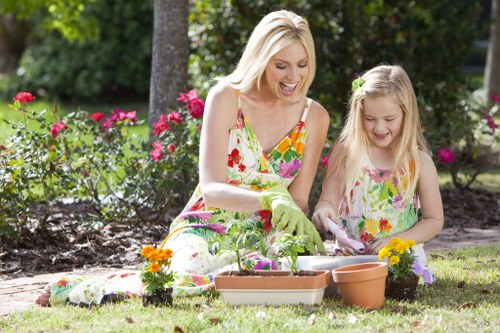
Maintaining a beautiful garden in Manor Park requires regular care and attention. Proper garden maintenance ensures that your outdoor space remains vibrant and healthy throughout the year.
From pruning to weeding, each task plays a crucial role in the overall health of your plants. Understanding the basics of garden upkeep can help you create a stunning landscape that enhances your home's curb appeal.
In Manor Park, the climate and soil conditions are unique, making it essential to tailor your maintenance practices accordingly. This guide will walk you through the essential steps for effective garden maintenance.
Seasonal Garden Care
Spring Maintenance
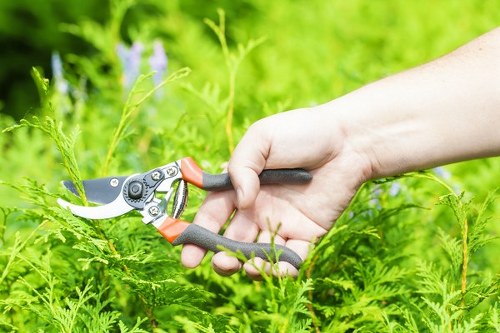
Spring is a vital time for garden maintenance. As plants begin to grow, it’s important to prepare your garden for the upcoming seasons.
Here are key tasks for spring:
- Clearing debris and dead plants
- Pruning shrubs and trees
- Planting new flowers and vegetables
Starting your garden maintenance in spring sets the foundation for a thriving garden all year round.
Summer Maintenance
During the summer months, gardens require consistent care to handle the heat and ensure plants remain healthy.
Summer maintenance tasks include:
- Regular watering, especially during dry spells
- Mulching to retain soil moisture
- Monitoring for pests and diseases
Proper summer care helps your garden withstand the challenges of high temperatures and maintain its beauty.
Essential Garden Tools
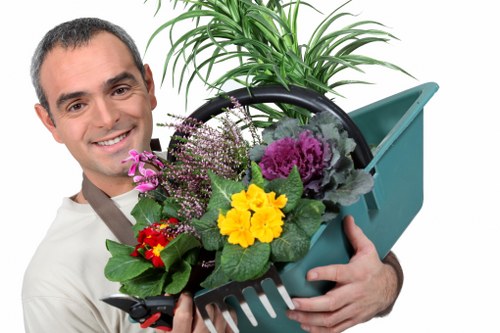
Having the right tools is essential for effective garden maintenance. Investing in quality equipment can make your gardening tasks easier and more efficient.
Here are some must-have garden tools:
- Pruning shears
- Garden gloves
- Hand trowel
- Watering can or hose
Using the appropriate tools ensures that you can perform maintenance tasks accurately and safely.
Advanced Gardening Equipment
For larger gardens or more intensive maintenance, consider investing in advanced equipment such as:
- Lawnmowers for maintaining grass areas
- Rototillers for preparing soil
- Leaf blowers for clearing debris
These tools can significantly enhance the efficiency of your garden maintenance routine.
Soil and Fertilization
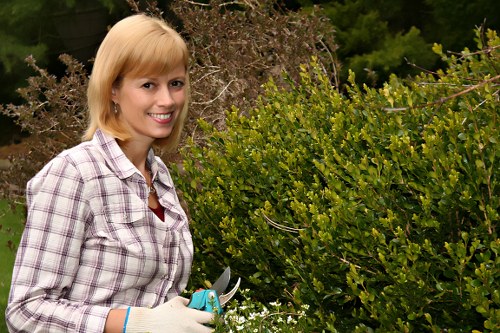
Healthy soil is the foundation of a flourishing garden. Proper soil maintenance and fertilization are crucial for plant growth.
Key aspects of soil care include:
- Testing soil pH levels
- Adding organic matter such as compost
- Rotating crops to prevent soil depletion
Regular fertilization provides essential nutrients, promoting strong and vibrant plant growth.
Organic vs. Chemical Fertilizers
Choosing between organic and chemical fertilizers depends on your gardening preferences and environmental considerations.
Organic fertilizers, like compost and manure, improve soil structure and promote biodiversity. Chemical fertilizers offer targeted nutrient delivery but may have negative environmental impacts if overused.
Pest and Disease Management
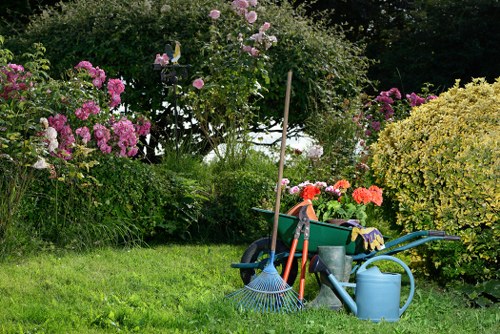
Protecting your garden from pests and diseases is a critical aspect of garden maintenance. Early detection and control can prevent significant damage.
Effective pest management strategies include:
- Regular monitoring and inspection
- Using natural predators like ladybugs
- Applying organic pesticides when necessary
Maintaining plant health through proper care also reduces susceptibility to diseases.
Integrated Pest Management (IPM)
IPM is a sustainable approach that combines multiple strategies to manage pests with minimal environmental impact.
Components of IPM include:
- Biological control
- Cultural practices
- Chemical interventions as a last resort
Implementing IPM can lead to a healthier and more resilient garden.
Watering and Irrigation
Proper watering is essential for garden maintenance. Ensuring that plants receive the right amount of water supports their growth and health.
Consider the following tips for effective watering:
- Water early in the morning to reduce evaporation
- Use drip irrigation systems for targeted watering
- Monitor soil moisture levels regularly
Efficient watering practices conserve water and promote sustainable gardening.
Rainwater Harvesting
Harvesting rainwater is an eco-friendly way to supply your garden with natural water resources.
Benefits of rainwater harvesting include:
- Reducing water bills
- Decreasing dependence on municipal water supply
- Providing natural, chemical-free water for plants
Implementing rainwater harvesting systems can enhance your garden's sustainability.
Pruning and Trimming
Regular pruning and trimming are vital for maintaining the shape and health of your plants. These practices prevent overgrowth and encourage new growth.
Key pruning techniques include:
- Removing dead or diseased branches
- Shaping shrubs and trees
- Thinning dense foliage to improve air circulation
Proper pruning can enhance the aesthetic appeal and longevity of your garden plants.
When to Prune
Different plants require pruning at specific times of the year. Understanding the appropriate timing ensures optimal results.
Generally:
- Prune flowering shrubs after they bloom in spring
- Tree pruning is best done in late winter
- Regular maintenance pruning can be performed throughout the growing season
Lawn Care
A well-maintained lawn is a cornerstone of beautiful garden maintenance in Manor Park. Proper lawn care involves mowing, fertilizing, and aerating.
Essential lawn maintenance practices include:
- Mowing regularly to the correct height
- Overseeding to fill bare spots
- Applying appropriate fertilizers
Healthy lawns enhance the overall appearance of your garden and provide a lush space for outdoor activities.
Dealing with Lawn Pests
Lawn pests can damage grass and disrupt your garden's beauty. Identifying and controlling pests is crucial for maintaining a healthy lawn.
Common lawn pests include:
- Grubs
- Sod webworms
- Chinch bugs
Implementing pest control measures promptly can prevent extensive lawn damage.
Garden Planning and Design
Effective garden maintenance starts with thoughtful planning and design. A well-designed garden is easier to maintain and more visually appealing.
Consider the following when planning your garden:
- Plant selection based on climate and soil
- Layout that allows for easy access and movement
- Incorporation of paths, seating areas, and decorative elements
Strategic garden design ensures that maintenance tasks are manageable and the garden remains beautiful year-round.
Choosing the Right Plants
Selecting plants that thrive in Manor Park’s environment reduces maintenance efforts and enhances garden resilience.
Opt for native plants and those adapted to local conditions. This approach conserves resources and supports local biodiversity.
Mulching Techniques
Mulching is an essential practice in garden maintenance, offering numerous benefits such as moisture retention, temperature regulation, and weed suppression.
Types of mulch include:
- Organic mulches like wood chips and straw
- Inorganic mulches such as gravel and rubber
- Living mulches like ground covers
Choosing the right mulch type depends on your garden's specific needs and aesthetic preferences.
Applying Mulch Effectively
Proper mulch application enhances its effectiveness and longevity.
Steps for applying mulch:
- Prepare the soil by removing weeds
- Apply a 2-3 inch layer of mulch around plants
- Maintain the mulch layer by replenishing as needed
Garden Lighting
Incorporating lighting into your garden enhances its beauty and extends its usability into the evening hours. Proper lighting highlights key features and improves safety.
Consider integrating the following lighting elements:
- Pathway lights for safe navigation
- Spotlights to accentuate trees and focal points
- String lights for ambiance in seating areas
Strategic garden lighting enhances both functionality and aesthetics.
Energy-Efficient Lighting Options
Opting for energy-efficient lighting solutions reduces energy consumption and environmental impact.
Popular options include:
- Solar-powered lights
- LED fixtures
- Motion-sensor lights
Implementing energy-efficient lighting ensures sustainable garden illumination.
Weed Control Strategies
Weeds can quickly overtake a garden, competing with desired plants for nutrients and space. Effective weed control is a key aspect of garden maintenance.
Strategies for managing weeds include:
- Manual removal through hand-pulling or hoeing
- Using mulch to suppress weed growth
- Applying pre-emergent and post-emergent herbicides responsibly
Consistent weed control efforts keep your garden neat and healthy.
Preventative Measures
Implementing preventative measures can reduce the incidence of weeds in your garden.
Preventative techniques include:
- Regularly inspecting and maintaining garden beds
- Using landscape fabrics where appropriate
- Encouraging healthy plant growth to outcompete weeds
Sustainable Gardening Practices
Adopting sustainable practices in garden maintenance benefits both your garden and the environment.
Key sustainable gardening practices include:
- Composting organic waste
- Using native and drought-resistant plants
- Implementing water conservation techniques
Sustainability in gardening promotes long-term health and reduces ecological footprint.
Eco-Friendly Pest Control
Eco-friendly pest control minimizes environmental impact while effectively managing garden pests.
Methods include:
- Introducing beneficial insects
- Using neem oil and other natural pesticides
- Encouraging plant diversity to deter pests
Hardscaping and Garden Structures
Incorporating hardscaping elements like patios, fences, and garden structures can enhance your garden's functionality and aesthetic appeal.
Popular hardscaping features include:
- Garden paths and walkways
- Water features such as fountains and ponds
- Raised beds and pergolas
Thoughtfully designed hardscaping complements plant life and adds visual interest to your garden.
Choosing Durable Materials
Selecting durable materials ensures that your garden structures withstand the local climate and require minimal maintenance.
Consider materials like:
- Natural stone
- Recycled composites
- Weather-resistant metals
Outdoor Furniture and Decor
Integrating outdoor furniture and decor enhances the usability and beauty of your garden. Comfortable seating and decorative elements create inviting outdoor spaces.
Essential outdoor elements include:
- Weather-resistant furniture
- Garden sculptures and art
- Functional items like benches and tables
Choosing the right decor adds personality and charm to your garden.
Maintenance of Outdoor Furniture
Proper maintenance of outdoor furniture ensures longevity and sustained aesthetics.
Maintenance tips include:
- Cleaning regularly to prevent dirt and grime buildup
- Protecting furniture from harsh weather with covers
- Performing repairs promptly to address wear and tear
Composting and Waste Management
Composting is an eco-friendly aspect of garden maintenance that recycles organic waste into valuable soil amendments.
Benefits of composting include:
- Reducing household waste
- Enhancing soil fertility
- Promoting healthy plant growth
Setting up a compost system in Manor Park can contribute to sustainable garden practices.
Setting Up a Compost Bin
Creating a compost bin is straightforward and beneficial for your garden.
Steps to set up a compost bin:
- Choose a suitable location with good airflow
- Combine green materials (kitchen scraps) and brown materials (dry leaves)
- Maintain moisture and turn the compost regularly
Proper composting accelerates the decomposition process, resulting in rich compost for your garden.
Professional Garden Services
While DIY garden maintenance is rewarding, sometimes hiring professional services can ensure optimal results. Professional gardeners in Manor Park offer expertise and manpower to keep your garden in top shape.
Benefits of professional garden services include:
- Expert knowledge of local plant species
- Efficient handling of large-scale maintenance tasks
- Customized garden care plans
Hiring professionals can save time and enhance the beauty and health of your garden.
Choosing the Right Garden Service
Selecting a reputable garden service involves considering factors such as experience, services offered, and customer reviews.
Tips for choosing the right service:
- Research local garden maintenance companies
- Check for certifications and insurance
- Request quotes and compare services
Conclusion
Effective garden maintenance in Manor Park involves a combination of regular care, proper planning, and sustainable practices. Whether you choose to manage your garden yourself or hire professionals, maintaining your garden will lead to a beautiful and thriving outdoor space.
Start implementing these maintenance strategies today and enjoy a lush, vibrant garden all year round.
Contact us today to learn more about our garden maintenance services and how we can help you achieve the garden of your dreams!